Photographs: Jahnavi Sheriff Shameem Akthar
The headstand or sirsasana is referred to as the king of all poses. Though some schools of yoga are cautious about teaching it, it is rather a simple pose once you get the abdominal and back strength to stay up. It is essentially a pose of balance rather than of strength. In a previous feature we covered poses you may do as substitute to the headstand (http://specials.rediff.com/getahead/2008/mar/10slid1.htm), here we present poses that may also be used as preparatory poses.
When you start on these poses you must ensure you do not have any spinal problems, especially of the neck or lower back. Your upper body strength should also have been developed through regular practice of the shoulderstand (sarvangasana) and some yogic dips like the prishtasana or the lizard pose. Even the advanced cat stretch (marjariasana) and the mountain pose (parvatasana) help to strengthen the upper back.
The sirsasana or the headstand and all is variations or preparatory poses are not advised for those with high blood pressure, cardiac problems or severe ear or eye infections. After each of these poses you may wish to do a few neck circles to relieve the pressure on your neck.
Here Shameem Akthar, yoga acharya, trained with the Sivananda Yoga Vedanta Center, instructs you on four preparatory poses for the headstand.
Catch more of Shameem's yoga writings or upcoming workshops from http://jaisivananda.blogspot.com
(This column only seeks to share the author's enthusiasm towards yoga. Yoga is best learnt under expert guidance.)
Dolphin pose
Image: Dolphin poseGo on your fours as in the classic cat stretch, on your knees and palms. Drop on your elbows, placing lower arms on ground. Lift up on your toes, straightening the legs. Interlock fingers. Inhale. Exhaling move the torso slightly over arms.
Hold for a few minutes. Then inhale, return to the starting position. This is essentially a push-up pose, rocking over the interlocked hands.
Do five times initially. Then increase rounds to ten or more.
Benefits: It builds strength, prepares you for the headstand. Improves focus.
Dolphin pose, advanced version
Image: Dolphin pose, advanced versionGo on your fours as above. Now intensify the rocking motion, as well as the going further in front over the hands. This is more challenging.
To do this, move the feet further back than in the previous pose. Do five rounds initially, then you may increase it to ten. Attempt this only after you have gained mastery over the first version.
Benefits: Same as above, more intense.
Sirsasana (Headstand, stage 1)
Image: Sirsasana, headstand, stage 1Go on your knees. Bend forward to place elbows on ground. Interlock fingers to form a cup with them. Place forehead on the hands so that the hairline is touching the little fingers. Continue normal breath.
Now walk your feet towards the torso, in front, till your back is almost upright, as shown. Hold it for a few seconds. Then release, settle down back on your knees.
Keep the head down for a few minutes till the blood circulation is normal. Then raise head, circle the neck a few times to relieve any pressure.
Benefits: This is the first stage of the sirsasana with all its benefits, without the challenge of balance. Ideal for those who wish to do it but are fearful of attempting it. It prepares you for the headstand by exposing and acclimatising your body to the intense pressure felt at the fingers and the crown.
Pranamasana (Prayer pose)
Image: Pranamasana, prayer poseSit on your heels. Exhale. Kneeling down, lean forward to place both palms flat on ground so now you are on your fours. Continue breathing. Gently place crown on floor/yoga mat. Use a towel (under the head) so that you don't feel any discomfort. Roll further, so that the neck locks between collar bones.
Keep the back up instead of slumping. Hips should also be up. Stay in the pose as long as is comfortable, breathing steadily throughout. To release, sit back on the knees, raising head. Roll your neck to the left side and right side gently to release any tension.
Over six weeks you must steadily increase duration in the pose from a few seconds initially to at least a minute. Increasing the time further, to two minutes or more is advised if diet control and weight loss is your goal.
Benefits: Apart from preparing you for the headstand, it also gives a powerful traction to the spine, is used in fat loss and hunger control and asthma therapy.

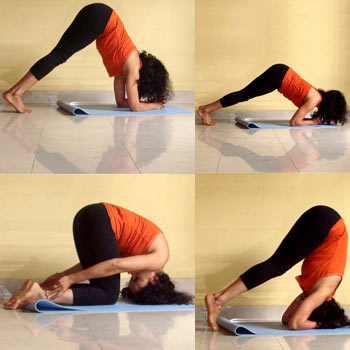
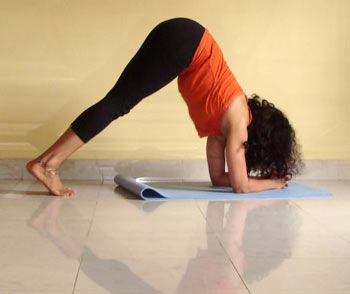
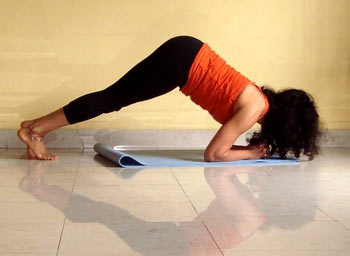
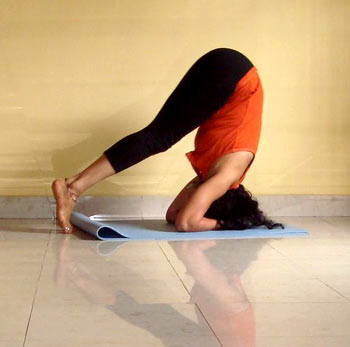
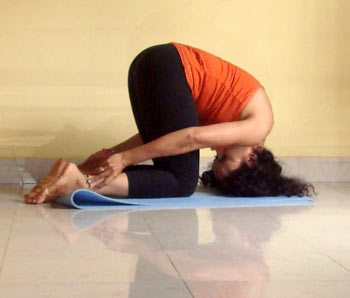
Comment
article